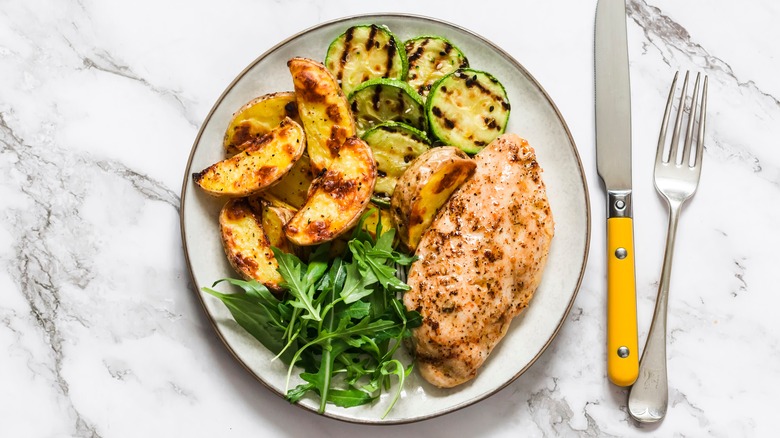The Seasoning-To-Weight Ratio You Need To Remember For Chicken
Seasoning a dish is arguably the most important part of cooking. Of course, temperature matters, as does following the proper cooking process, but is it even worth it if you serve up a totally bland dish to guests?
Seasoning can happen in a variety of forms, but the most important one to consider is salt. Chef Samin Nosrat wrote in The New York Times that salt "has a greater impact on flavor than any other ingredient." However, she adds that cooking good food isn't necessarily about using more salt, but rather just using it "better."
Salt should be an element in every single dish, but depending on what you're cooking, other seasonings matter, too (per Lovefood.com). When it comes to chicken, there is one easy seasoning rule to follow that will help you get the most out of your meat. So, how much — and when — should you season your poultry?
Here's how much you should season your chicken
On its own, chicken is bland — this is good thing, though, because that makes chicken a versatile recipe ingredient that can be served on its own, or in anything from soups and salads to pastas and pot pies. And when it comes to seasoning, the chicken's weight matters. According to MasterClass, to understand the proper amount of seasoning, simply check the weight of your chicken. For every pound the chicken weighs, you should add one tablespoon of seasoning.
Ina Garten has long said that she only cooks small chickens that weigh less than five pounds due to their better flavor, but we're certain she doesn't under-season her birds. In this case, she'd use at least four tablespoons of seasoning.
The seasonings used to cook chicken are ultimately up to the one cooking it. However, salt is an essential ingredient and should be used in that seasoning blend (per Lovefood.com). Many basic chicken seasonings will contain herbs such as thyme and rosemary, along with spices like onion powder and garlic powder.
When should you season your chicken?
In addition to how much seasoning you use, the timing of when that seasoning is applied is also essential. You might think you season a chicken just before cooking it, but you're missing out on its deepest, most savory flavor by doing yourself this disservice.
Cooking Channel reports that poultry should be salted no less than six hours before you cook it. If you're buying a whole chicken that day to cook it for dinner, any amount ahead of time you can season it is better than no time. However, if you're purchasing your chicken to cook later in the week, you should salt it at least one day before you cook it, and even up to four days prior. This is because the extra time allows the salt to permeate the meat, giving that savory flavor throughout as opposed to just right on the surface.
If you're adding additional seasonings to create a rub, the timing is a bit different. Better Homes & Gardens suggests to only add the rub up to two hours prior to cooking the chicken. In that case, the bird should be salted several days in advance (if possible), but seasoned much closer to its cooking time for any additional herbs and spices.


